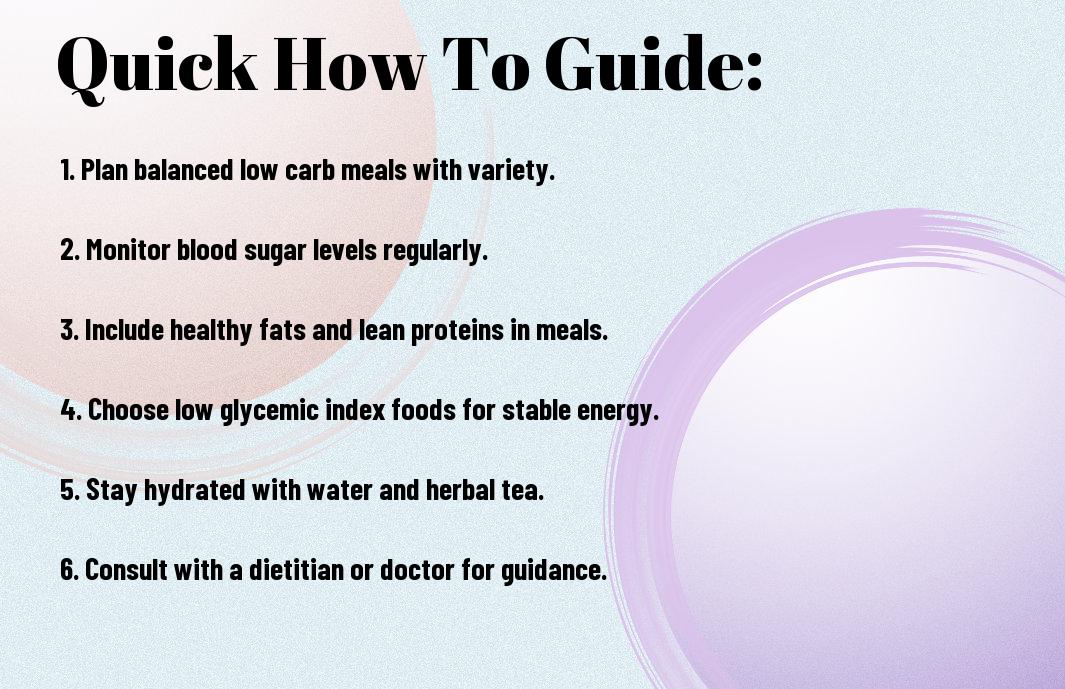Striking a balance between maintaining a low carb diet and managing diabetes can be challenging, but with the right knowledge and strategies, it is entirely possible. In this guide, we will provide you with practical tips and advice on how to stay balanced while following a low carb diet as a diabetic. By implementing these techniques, you can effectively manage your blood sugar levels while still enjoying a healthy and fulfilling diet.

Preparing for a Low Carb Diet
While following a low carb diet as a diabetic, it is essential to prepare yourself both mentally and physically. This preparation will set you up for success and make the transition to a low carb lifestyle much smoother.
Essential Factors for Success
To successfully follow a low carb diet as a diabetic, there are several essential factors you need to consider. Firstly, it’s crucial to educate yourself about the relationship between carbohydrates, blood sugar levels, and insulin. Additionally, you should seek guidance from a registered dietitian or healthcare provider who specializes in diabetes management. They can help you create a personalized low carb meal plan and provide ongoing support and monitoring. Assume that you will need to make adjustments to your diabetes medication as you transition to a low carb diet to ensure your blood sugar levels remain stable.
Setting Realistic Goals
One of the key components of successfully following a low carb diet as a diabetic is setting realistic goals. It’s important to understand that the transition to a low carb lifestyle may take time and require some trial and error. Factors such as your current eating habits, activity level, and insulin sensitivity will all play a role in determining the right approach for you. By setting realistic goals, such as gradually reducing your carb intake and monitoring your blood sugar levels, you can make sustainable progress towards better diabetes management.
Practical Tips for Daily Adherence
The key to successful low carb diet adherence as a diabetic lies in practical daily strategies. By implementing the following tips, you can maintain balance and achieve your health goals. For a comprehensive guide on healthy low carb eating with diabetes, check out A Guide to Healthy Low Carb Eating with Diabetes.
- Plan your meals mindfully
- Monitor your carb intake
- Make informed choices when eating out
- Stay prepared for social events
Knowing how to navigate daily challenges will empower you to stay on track and control your diabetic symptoms effectively.
How to Plan Your Meals
Daily meal planning plays a crucial role in maintaining a balanced low carb diet while managing diabetes. By strategically incorporating low carb, high fiber foods and lean proteins into your meals, you can help stabilize blood sugar levels and provide sustained energy throughout the day.
Managing Carb Intake Effectively
Adherence to a low carb diet as a diabetic requires mindful management of carb intake. Monitoring the grams of carbohydrates consumed per meal and selecting low glycemic index foods can help in controlling blood sugar levels and reducing the need for insulin or other medications.
With regular monitoring and adjustments, you can effectively manage your carb intake and improve your overall health and well-being as a diabetic.
Tips for Eating Out and Social Events
To maintain balance while eating out or attending social events, it’s important to plan ahead and make informed choices. Look for menu options that align with your low carb dietary goals, and don’t hesitate to ask restaurants for ingredient substitutions or modifications to suit your needs.
- Choose grilled or roasted protein options
- Select non-starchy vegetables as side dishes
- Opt for salads with dressing on the side
Assume that not all social events will have ideal food options readily available, so consider bringing a low carb dish to share or eating a small meal beforehand to avoid feeling pressured to indulge in high carb offerings.

Monitoring and Adjusting Your Diet
Not sure where to start with monitoring and adjusting your low carb diet as a diabetic? Check out A Beginner’s Guide to a Low Carb Diet for Diabetics to get started on the right track.
Identifying Key Nutritional Needs
Monitoring your nutritional needs is crucial when following a low carb diet as a diabetic. It’s important to focus on getting enough protein, healthy fats, and essential vitamins and minerals. Keeping track of your intake of these nutrients can help ensure that you are meeting your body’s needs while maintaining a balanced low carb diet.
When identifying key nutritional needs, it’s essential to work with a registered dietitian or healthcare provider who can help create a personalized plan tailored to your specific dietary requirements. They can also help you monitor your blood glucose levels and adjust your diet accordingly.
When and How to Adjust Your Diet for Balance
Any changes to your low carb diet should be made under the guidance of a healthcare professional. They can help you determine when and how to adjust your diet to achieve the right balance of nutrients while keeping your blood sugar levels in check.
This may involve making small tweaks to your meal plan, such as adjusting portion sizes, experimenting with different food combinations, or incorporating new low carb recipes and meal ideas. Regular monitoring and adjustments can help you stay on track and maintain a balanced low carb diet as a diabetic.
Holistic Management of Diabetes
Unlike conventional approaches to managing diabetes, a holistic approach takes into consideration the interconnectedness of the various aspects of health and well-being. It emphasizes the importance of addressing the physical, mental, and emotional aspects of diabetes management to achieve overall balance and wellness.
Incorporating Physical Activity
Diabetes management goes beyond just medication and diet. Physical activity plays a crucial role in regulating blood sugar levels and improving insulin sensitivity. Regular exercise helps to lower blood glucose levels and reduce the risk of cardiovascular complications, which are common in diabetic individuals. It is important for diabetics to incorporate a combination of aerobic exercises, strength training, and flexibility exercises into their routine to maximize the benefits of physical activity in managing their condition.
The Role of Stress Management and Sleep
On top of diet and exercise, stress management and adequate sleep are integral parts of holistic diabetes management. Chronic stress can lead to elevated blood sugar levels, while poor sleep can disrupt insulin production and glucose regulation. Holistic management of diabetes involves implementing stress-reducing techniques such as mindfulness, meditation, and deep breathing exercises, as well as prioritizing quality sleep to support overall health and diabetes management.
Holistic management of diabetes recognizes the impact of lifestyle factors such as physical activity, stress management, and sleep on blood sugar regulation and overall well-being. By addressing these interconnected aspects of health, individuals with diabetes can achieve better balance and improve their quality of life.

